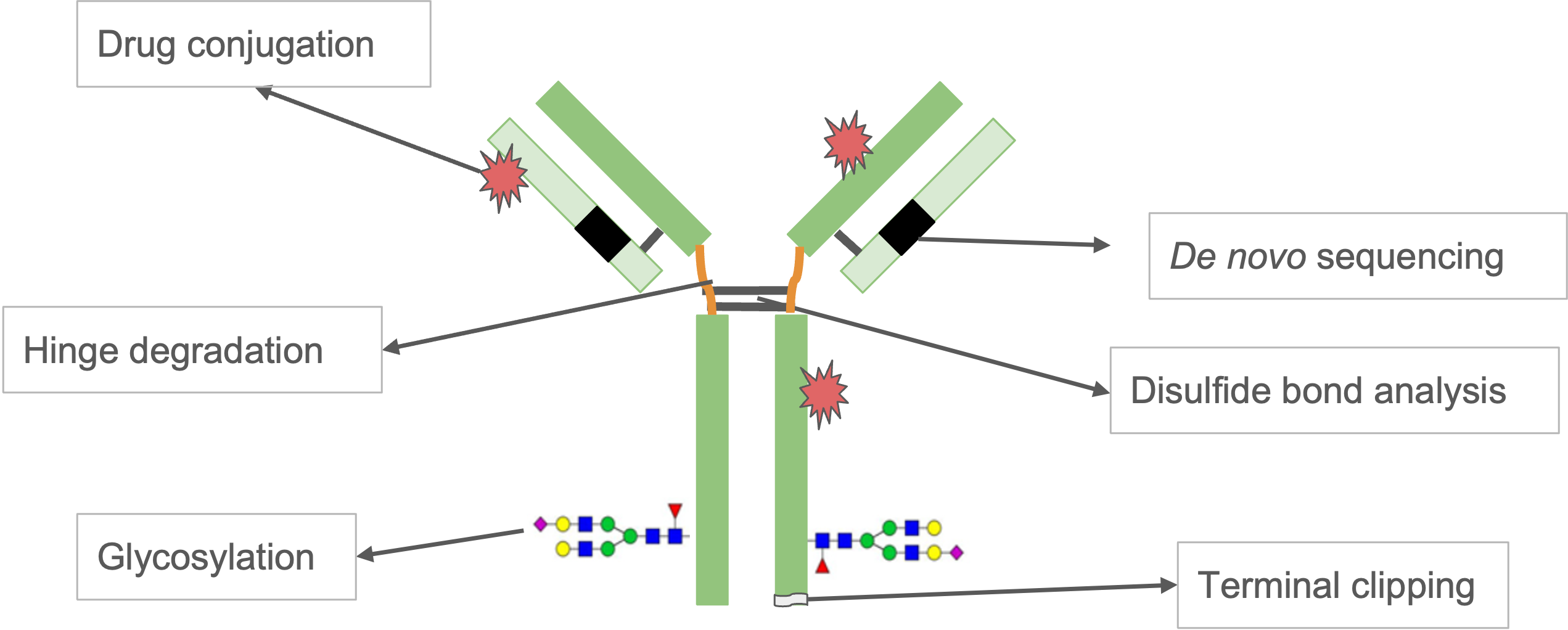- About
-
Solutions
-
Services
- Biosciences
- Chemistry
- Integrated Drug Discovery
- Computer Aided Drug Design
- Hit Identification
- Target Classes and Modalities
- Therapeutic Areas
-
A-Z
- A
- B
- C
- D
- E
- F
- G
- H
- I
- K
- L
- M
- N
- O
- P
- R
- S
- T
- V
- X
-
Services
- Library
- News & Events
- Careers
Biotherapeutics
Beyond small-molecule drug discovery
Domainex offers a range of services ideal to support biotherapeutic programmes including antibody expression and purification, bioanalysis, structural biology and biophysics.
Biotherapeutics (or biologics) are medicines which are derived from living cells or through biological processes and include hormones, vaccines, monoclonal antibodies, recombinant proteins, gene and cellular therapies, amongst others.
Protein Science and Structural Biology
Our highly skilled team of protein scientists routinely express and purify antibodies using mammalian transient expression systems. We can also produce the corresponding antigens, for example receptor ectodomains or hormones. A range of techniques can be used to characterise antibodies and their antigens, including analytical size exclusion chromatography (SEC), dynamic light scattering (DLS), differential scanning fluorimetry (DSF) (including binding studies) and mass photometry. Using these techniques, we can characterise the oligomeric state, stability, aggregation and antigen binding of the protein samples.
Our structural biology capabilities are routinely applied to biotherapeutic projects. Depending on the system studied, X-ray crystallography and cryo-EM are both excellent techniques to derive the atomic structure of biomolecules of interest. Where required, protein components are mixed in the correct ratio, for example an antibody Fab fragment and its corresponding antigen, and the complex is purified and confirmed to be stable using SEC, prior to entering crystallisation trials (X-ray crystallography), or being frozen on grids (cryo-EM).
Bioanalysis
Our bioanalytical sciences team uses advanced mass spectrometry (MS) techniques to provide deep molecular insights into biologic products to ensure quality and efficacy. Our MS service offers unmatched precision in detecting and analysing complex biomolecules (Figure 1) to confirm molecular identity, detect subtle structural variations, and monitor lot-to-lot consistency.

Figure 1: Characterisation of an engineered antibody by mass spectrometry
Our key services include:
- Molecular weight confirmation
Verifying the intact mass of antibodies and other proteins to ensure correct expression and formulation, e.g. affinity tag removal, mis-paired bi-specific antibodies, etc.
- Product heterogeneity
Detection and quantification of minor variants or degradation (e.g. terminal clipping) that may arise during production or storage.
- Post-translational modifications (PTMs)
Identification and characterisation of critical PTMs such as glycation, glycosylation, phosphorylation, and oxidation that can influence drug stability and efficacy.
- Disulfide bond analysis
Ensuring correct folding and structural integrity by mapping disulfide bridges.
- Peptide mapping
Breaking down the protein into peptides and mapping them via MS to confirm the sequence and detect modifications.
- Antibody-drug conjugate (ADC) analysis
ADC analysis is the characterisation and quality control of an antibody that is chemically linked to a drug molecule. At full molecular level, the analysis checks payload identity and purity, Drug-to-Antibody Ratio (DAR) and linker stability. The antibody can be partially digested to localise the drug at sub-molecular level (drug on heavy chain or light chain, Fab region or Fc region, etc). The antibody can also be fully digested into peptides to identify the drug conjugation site by peptide mapping.
- Antibody isotyping
MS is a powerful technique to determine the immunoglobulin (Ig) subclass, such as IgG (IgG1, IgG2, IgG3 and IgG4), IgA, IgM, IgE, IgD, as well as the light chain type (kappa or lambda) of monoclonal or polyclonal antibodies. This can be achieved by intact MS analysis of the whole antibody, middle-down MS analysis of Fc/2 fragments, and bottom-up MS analysis of signature peptide sequences of antibody isotypes.
- De novo sequencing
De novo sequencing refers to determining the amino acid sequence of a protein without prior knowledge of DNA or protein sequence. Using special algorithms and high-quality data from high resolution mass spectrometry, our de novo sequencing service helps recover the sequence of valuable antibodies when the original hybridoma or genetic information is unavailable. It is also important for bio-similar characterisation or resolving ambiguity from DNA sequencing of the monoclonal antibody or other therapeutic proteins.
Binding and functional studies
Domainex can perform a range of biophysical, biochemical and cell-based techniques to characterise the binding and function of biologics including spectral shift, Grating Coupled Interferometry (GCI) (a similar technique to Surface Plasmon Resonance (SPR)), TR-FRET, AlphaLISA®, ITC, cellular imaging and flow cytometry. These techniques can give important information such as affinity, binding kinetics, thermodynamics and the functional effect of the biological samples.
Start your next project with Domainex
Contact one of our experts today